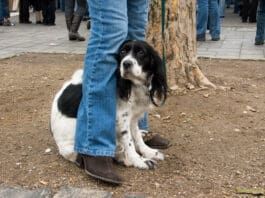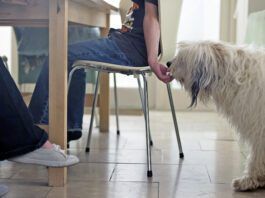Does Your Female Dog Hump?
Usually humping is associated with male dogs, but humping is also very common amongst female dogs. Some girls will hump toys or other objects, some hump air, others hump other dogs or even people. To learn more about humping, why girls do it, and how to keep your female dog from humping, we talk with Certified Professional Dog Trainer and Chair of The Association of Professional Dog Trainers Nick Hof, CPDT-KA, CBCC-KA, KPA-CTP, CSAT, to answer some of your most commonly asked questions about female dogs and humping.
Comfort Your Dog
There is absolutely no evidence, not one bit, suggesting that providing comfort and security to a distressed dog causes the dogs anxiety or fear to increase. Why then, does this myth persist among dog owners and even with some trainers? Why are owners still advised to ignore their dog when he is distressed or anxious or fearful, as if providing any attention to the dog will reinforce those emotions?
Moving with Dogs: Everything You Need to Know
Moving to a new house regardless of whether it's down the street or across the country is stressful for anyone, but for dogs it can be especially confusing and upsetting. I just moved my three dogs (ages 16 years to 21 months, 10 pounds to 100 pounds) from New York City to Portland, Oregon. The move has been a bit hectic, but my biggest priority has been creating stability and consistency for my dogs.
Is My Dog Depressed?
When a dog is suddenly no longer interested in their favorite activities, whether it's playing Frisbee in the park or chasing squirrels in the backyard, most animal behavior experts will tell you to look for a physical explanation, not a mental-health recommendation. Taking your four-legged friend to the vet for a physical exam should always be the first response to what seems like depression. A change in behavior can usually be attributed to underlying physical conditions like arthritis or pain.
The Emotional Lives of Dogs
Traditionally, dog trainers have spent little or no energy considering a dog's emotions when training or changing behavior; indeed, trainers or owners who did talk about emotions were often ridiculed and accused of anthropomorphizing. But when emotions are driving behavior, a dog cannot simply choose to stop doing the behavior without ramifications. The reality is that animals (including people) are quite often not rational actors. If that sounds counterintuitive to you and you believe that behavior is largely chosen rather than the result of emotional experiences, perhaps a few examples will help you understand.
Train Your Dog to Accept Hugs
The process of teaching a dog to tolerate hugging involves either classical conditioning (giving a puppy a positive association with something she doesn't already have an opinion of), or classical counter-conditioning (giving a dog a new association with something she already has a negative opinion of). Either way, the process is similar, but it may go slower if you are working to change an existing opinion rather than simply installing one where none previously exists.
Stop Urine Marking in the House
This dog had developed a strong habit of urine marking in the house. His owner is managing the situation by making the dog wear a belly band (with a disposable sanitary pad inside), while also encouraging him to use puppy pads" to relieve himself if need be. A security camera confirmed that he's using the pads!üKeep a close watch on your dog
Postpartum Depression and Its Effect on the Dog
As a trainer and behavior consultant, I am always ready to provide all sorts of helpful information and internet links on the subject of bringing home a new baby to meet the dog. But I can honestly say that I never considered the emotional and hormonal component of the new mom and how it would affect her relationship with her pets.
Beauty for Ashes
Competing with our Sheltie Asta at her first agility trial was an answer to our prayers. After her diagnosis, we lived with months of uncertainty about what type of life she might have. Following her lovely debut, a friend aware of Asta's condition commented on how normal" it all looked. But our path to that first agility competition was anything but "normal" because Asta has a mental illness."
Solving Your Dog’s Behavior Problem Crisis
One of the most irritating and common phone calls I receive in my capacity as a professional dog trainer is when dog owners urgently ask me to help solve their dog's behavior problem immediately even though, as it often turns out, the problem has actually existed for years. Sometimes, it's even phrased as, If we can't get this fixed now
How a Mother’s Stress Can Influence Unborn Puppies
Can a highly stressful environment during pregnancy affect how puppies turn out? Imagine this: A young dog goes stray and lives on urban streets for two months, in almost constant fear. Kids chase her down a street, throwing rocks at her; she is attacked by another dog; and she struggles every day to scavenge enough to eat. At last she is apprehended by an animal control officer and brought to a shelter. Here she finally gets enough to eat, but she's still not able to relax; the shelter is full of strange smells and loud noises, her run is small, and the floor is hard. After she's been at the shelter for a few weeks, a shelter staff member realizes that she is pregnant and due very soon. The shelter puts her on the waiting list for a foster home, knowing that puppies don't do well when they grow up in shelters.
Ways to Combat Your Dog’s Indoor Urine-Marking
I can still remember the day, more than a decade ago, when I first realized with horror that our Scottish Terrier, Dubhy (pronounced Duffy")

















